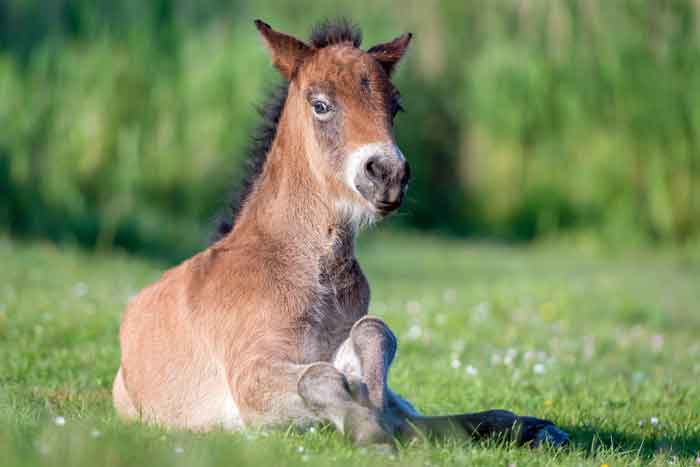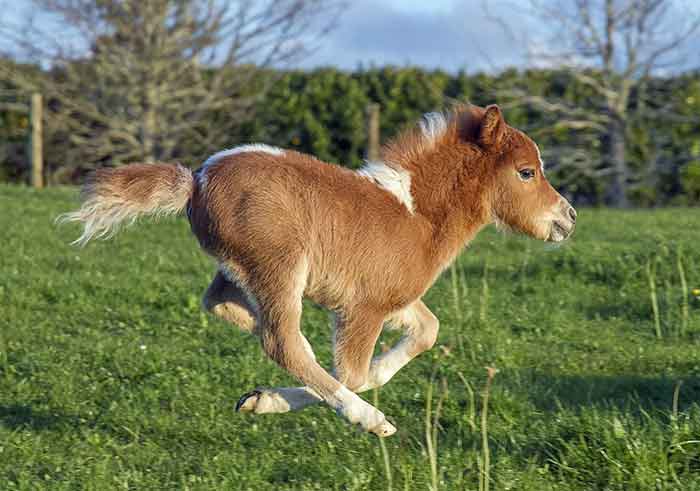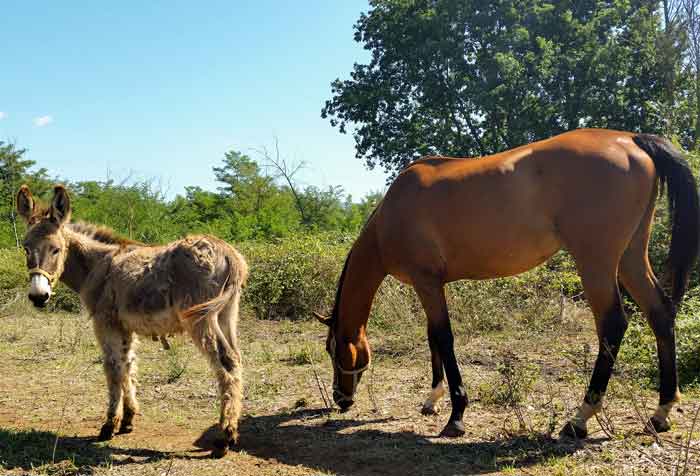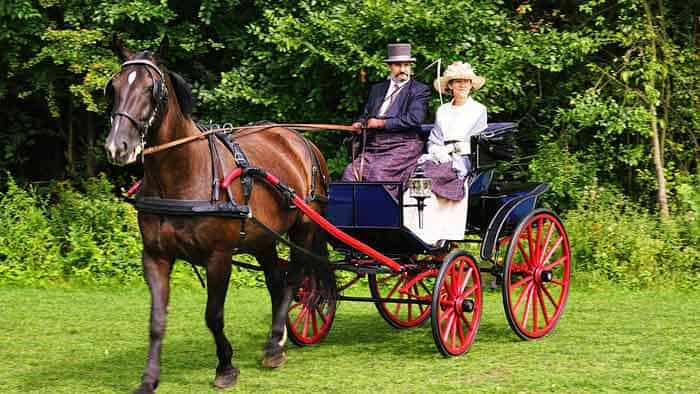Zebras and horses sure look like they are family. But how similar are the species and what are the differences except for the stripes and colors?
How are horses and zebras related?
They both belong to the Equidae family of horses. This family tree also includes Donkeys. The zebra has a now-extinct ancestor called the Quagga which was often described as half horse and half zebra.
But there are many more interesting similarities and differences we will look at.
Get ready for some amazing facts about horses and zebras!
Table of Contents
Why are horses and zebras considered different species?
zebras are actually a species of wild horses. They are all living in Africa (no zebras on other continents except in zoos) and they belong to the “Equidae family of the Equus genus”.
In other words, they are horses but an entirely other species than the horses we normally ride and use around humans.
Is there any half horse half zebra species?
Actually, there is or we should say, there WAS.
Below you can see a very special breed that became extinct around 230 years ago.
All zebras that we find today have stripes all over the body. But until 1883 there was a special breed of zebra without stripes. It too lived in Africa and it looked more like a horse.
This species was called the “Quagga” and it probably looked something like this:
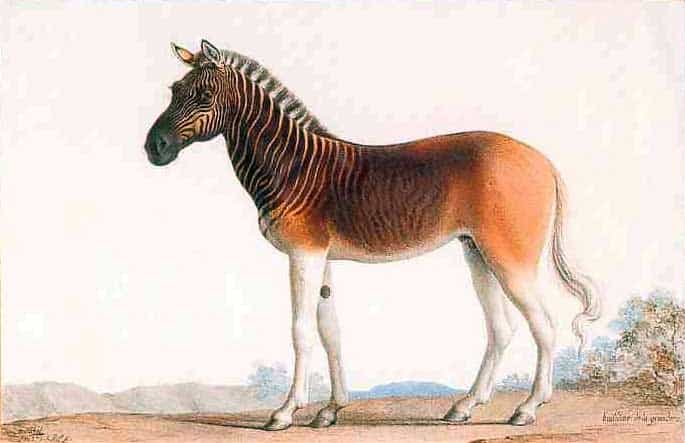
The Quagga zebras can to some extent be said to be a common ancestor of the zebras that was even more related to the horses than the zebras we find today.
It got its name from the sound it made according to history. It was very common in South Africa and it was often described as a horse and zebra hybrid.
Can zebras be trained (and ridden) like horses?
You cannot train and teach a zebra to be ridden like a horse. They have a more aggressive temperament and they don’t like to be controlled. They will not be tamed and are therefore not safe to ride.
We find a very different type of animal from the zebra when it comes to domestication.
It turns out there’s a good reason why you never see anybody trying to ride a zebra. And this reason has to do with the temperament and personality of the animal.
This all has to do with the herd mentality among horses which would don’t find to the same extent with zebras. Among a group of horses, we will always have the leading alpha male which is the leader of the flock. This is not the case with zebras.
zebras live more like individuals than in herds and they do not like to be managed. They do move around in groups but that’s more because there are obvious benefits than because they follow the leader of the flock.
This also means that you cannot domesticate a zebra-like you can with a horse. The zebra will not be tamed and follow your instructions.
The horse will let you become the leader and the alpha male which creates a very special bond and a master-follower type of relationship between the horse and its master.
Because the horse has a long history of belonging to a group of horses with a leader they are able to learn to listen and obey a human being. This is why you can count on a horse to do what it is told and taught.
Why are zebras not ridden like horses?
zebras are built differently. As we looked at above, the horse’s legs are longer and it also enables it to run quite a lot faster than the zebra.
The seating area of the horse where you mount the saddle is also very different build on the zebra.
zebras don’t have the wither which is where the neck of the horse begins.
6 Main Differences Between Horses & zebras
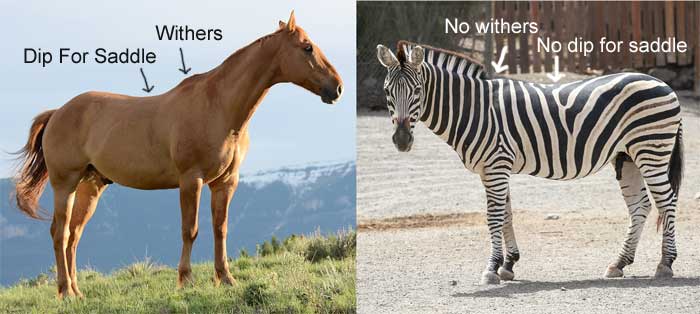
1) Horses are faster than zebras
Some people believe that zebras are faster than horses, but they are wrong. As you can see below horses are faster than zebras and there’s a good physical explanation for that.
The legs are a little longer on the horse. This means that they are able to move much quicker than zebras. The legs of the zebra are shorter and the typical domesticated horse is also a bit taller than the zebra.
- Horses can run up to 54 mph (88 km/h)
- zebra can reach up to 40 mph (64 km/h)
This is a clear physical difference between the horse and the zebra.
2) zebras are smaller than horses
Zebras are typically around 5 feet (1.5 meters) from the shoulder to the hoof. The horse, on the other hand, is more like 5.5 feet (1,68 meters) from the shoulder to the hoof.
This also explains why the horse is faster.
zebras also weigh less than a horse. The average zebra weighs 880 pounds (400 kilograms) while the horse can easily weigh up to 1,879 pounds (850 kilograms).
That being said, we also find horse breeds that are smaller and some are even smaller than the zebra.
3) The manes are different in length and style
Horses have long beautiful manes that can be braided in many different ways. This is not true about the zebra. The zebras have much shorter mane hair and it’s stiffer too.
As you can see from the picture above, the mane of the zebra is standing up and looks much more like that of a Donkey.
4) They make different sounds
We all know that a horse will neigh and you can also hear this sound among a flock of zebras. But you will also hear a sound that is very similar to the “Hee-Haw” sound of a Donkey.
The zebra can also produce a barking-type sound that is more similar to that of a smaller dog.
They can also snort. All in all, we get a lot more different sounds from the zebra which is a difference as well between the two otherwise similar animals.
5) The back is shaped differently
The back of the two animals is different. The horse has the perfect back for mounting a saddle. Take a close look at the commits a bath in this article. The horse has a clear dip for the saddle which makes it possible to mount to saddle and ride it comfortably without falling off.
We also find what is called “withers” in front of the dip. This bump also helps the rider keep the saddle in place. We find neither on the zebra.
There is a tiny bump where the horse withers is but nothing to support the saddle or keep the rider in place. The dip is also absent and that makes it very hard to ride the zebra even if they had the temper for it.
We will look a lot more at why it’s almost impossible to domesticate and train a zebra in the next section.
6) The temper is very different
Horses can be tamed as we will look at further down in the article. zebras, on the other hand, are not willing to submit to a master.
They are more aggressive and ill-tempered. They can go off at any time if they feel threatened or if they feel like doing something else than the “master”. This also makes them very hard to catch and if you catch one it will be in vain.
They will not let you teach them anything. They are stubborn and aggressive.
5 things zebras and horses have in commons
Here are 5 things zebras and horses have in common:
- They are around the same size. Zebras are typically around 15 hands which translates to 60” or 5′ (152 centimeters). This is equal to smaller horse breeds.
- They will both kick a fellow stallion if they are provoked
- They both have hoofs that are similar
- They sleep standing up.
- They are both herbivores and will eat primarily herbs, leaves, and grass in the wild.
Zebras and horses belong to the same family tree. They are both parts of the Equidae family of the genus Equus. That the main thing there is to say about similarities between zebras and horses.
Other than that, they have an obvious list of commonalities when you look at how they are built and how they move. They are obviously closely related, as we mentioned at the beginning of the article.
Are zebras closer to horses than donkeys?
Zebras are closely related to horses than donkeys. They all belong to the Equus family tree and zebras are directly related to horses whereas donkeys are one branch farther away from horses than zebras are.
Here’s exactly how zebras and donkeys are related to horses. As you can see, they are all a part of the “Equus” family tree which we mentioned earlier.
The horses are directly related to zebras while donkeys are actually closer related to zebras than horses.
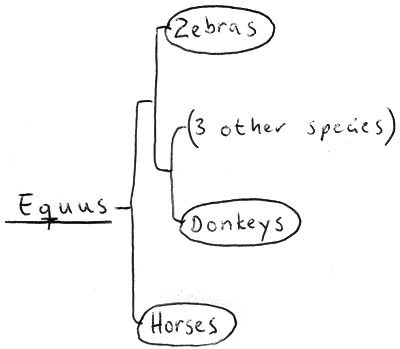
The 3 other species that are also related to zebras (like donkeys) are:
- Kiangs (Found in Kashmir, Ladakh, and the Tibetan plateau)
- Persian Onagers (Endangered species native to Iran)
- Turkmenian Kulans (smaller breed found in Central Asia)
Are zebras bigger than horses?
Zebras are around 15 hands tall to the withers while most horses are 15.75 hands-on average. So, horses are typically a bit taller than zebras but several horse breeds are smaller than zebras.
Zebras are a more homogenous species than horses because we have been breeding horses in any way possible. Most racehorses and draft horses are a bit bigger than zebras. But zebras are still taller than some of the smaller horse breeds.
But generally, horses are a little taller than zebras.
Are zebras smarter than horses?
Since we have a MUCH better track record of teaching tricks and good manners to horses than to zebras it is believed that horses are more intelligent.
zebras are loners that don’t like to be cuddled or managed. So it’s quite hard to tell whether they are intelligent enough to do much else than just living their life on the African savannah.
Remember, they are very aggressive and people have not managed to domesticate them in any way or to ride them.
Why are zebras not horses?
Well, in some regard, they are. They are distant relatives and they belong to the same family tree for sure. The closest relatives are horses and donkeys.
They belong to the “Equidae” family of animals.
This family includes:
- Zebras
- Horses
- Donkeys
The Equidae family again belongs to the Perissodactyla order, that includes Tapirs and Rhinos as well.



